Wie viel Plastik verbrauche ich?
Wir haben uns von dem Projekt "Family around the world join war on plastic-in pictures" inspirieren lassen und wollten es selbst ausprobieren. Die Idee war, dass die Teilnehmenden die Plastikbehälter, Flaschen, Verpackungen, Säcke usw. die sie während der Woche benutzen, sammeln und aufheben. Das ist sehr hilfreich für die Reflexion unseres Verbrauchs und die Auswirkungen auf die Umwelt. Denn oftmals verwenden wir Kunststoff in unserem täglichen Leben, ohne auch nur darauf zu achten. Daurch bemerken wir auch nicht, wie sehr wir damit zur Verschmutzung unserer Umwelt beitragen.
Das Thema ist riesig, immer noch aktuell und stellt eine der größten globalen Umweltherausforderungen dar. Tonnen von Plastik schwimmen in den Ozeanen, manchmal in mehreren Quadratkilometern großen Teppichen, manchmal als einzelne Teile oder als Mikrokunststoffe. Sie alle bedrohen die Gesundheit vieler Pflanzen und Tiere. Vögel, Wale, Fische, Schildkröten und viele andere Tiere werden in Plastik, wie z.B. alten Fischernetzen, eingehüllt und sterben schmerzhaft. Sie ersticken, ertrinken oder sind einfach zu verletzt um sich zu erholen. Einige Tiere sterben auch, weil sie zu viel Plastik verschluckt haben. Zum Beispiel verhungern Schildkröten oder Wale, da ihre Mägen mit Plastik gefüllt sind, welches sie nicht verdauen können. Dadurch haben sie keinen Platz mehr für richtiges Essen. Mikroplastik wurde bisher bei vielen Tieren im Verdauungssystem oder sogar in Zellen gefunden und wir wissen immer noch nicht genau, welche Auswirkungen dieses auf Tiere, Pflanzen und Menschen haben können.
Das Problem mit Plastikmüll muss sofort gelöst werden, um die Zukunft vieler Arten, die Gesundheit tausender Menschen und das Überleben unseres Planeten zu sichern! Die meisten Kunststoffe werden nur einmal verwendet und dann weggeworfen. Es gibt genug Alternativen, aber leider benutzen die meisten Leute diese noch nicht.
Hier findest du unsere Erfahrungen und Erkenntnisse, die wir während der Aktion gesammelt haben:
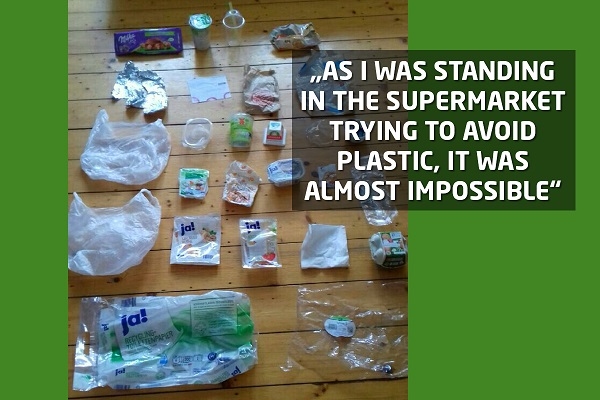
I am very shocked how much plastic waste this is! And this, even though I think it is less than usually, because I was travelling a lot this week and ate outside. My senses were sharpened to see where plastic comes up. For example on this picutres, waste that is produced (by me) by eating in restaurants is not represented in this picture. As I was standing in the supermarket trying to avoide plastic, it was almost impossible.
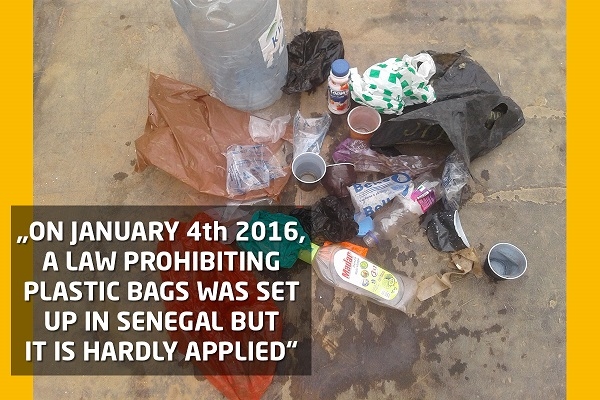
For me it is very difficult to estimate the amount of plastic I use. So this project really helped me to realize the quantity of only one week.
Being a friend of nature I try to avoid the use of plastic waste as much as possible. On January 4th 2016, a law prohibiting plastic bags was set up in Senegal but it is hardly applied. But I think the state has a great deal of responsibility for this problem. But still in the street, in the shops, at the market, there are thousands of plastic items that are used every day, and thrown on the ground to the great misfortune of the environment and the landscape. As the law is not really implemented by the state, we as population should also take responsibility and try to find alternatives and stop using plastics.
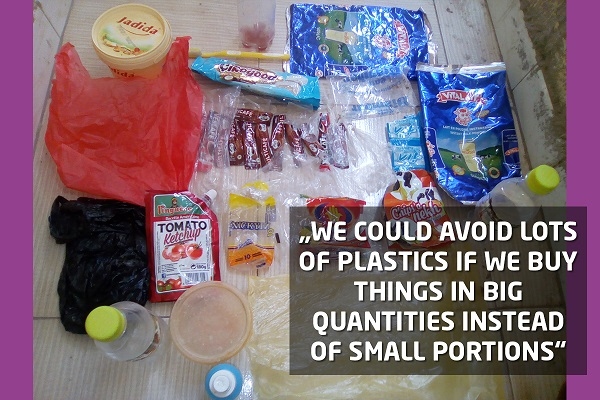
Well, this doesn't represent the whole week but at least it sums up the different kinds of plastics we use daily. As you can see most of them are small plastic bags. We could avoid lots of plastics if we buy in big quantity instead of small portions, which are each packed singularly.
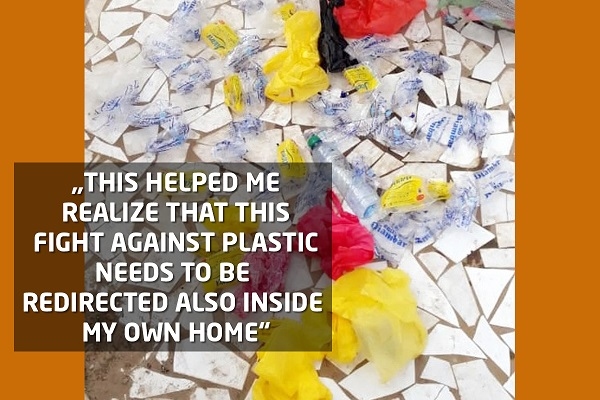
This “war on plastic “ pictures helped me a lot to know what plastics items are being used the most by my family members. I myself, I've stopped using plastic disposable items as much as possible particularly the plastic bags and cups. And I'm always leading fight against the use of plastic, trying to convince people outside to not use plastics. But this helped me to realize that this fight against plastic needs to be redirected also inside my own home. And I will not miss to do so...
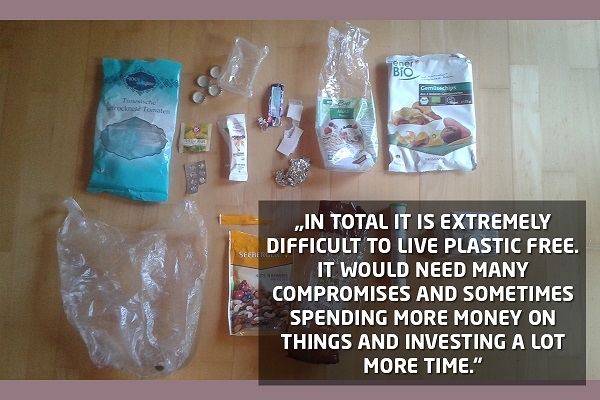
In some cases it is quite easy to prevent plastic. For example when buying vegetables on the market or bread at a bakery. But other basic foods, such as pastsa, rice, lentis, etc. are more diffucult to find not packaged in plastic. For me one big part of plastic wraping comes from snacks, such as nuts or bars. In total it is extremly diffucult to live plastic free, it would need many compromises and sometimes spending more money on things, investing more times to get to special stores etc. So I may only continue to try to reduce my plastic waste.
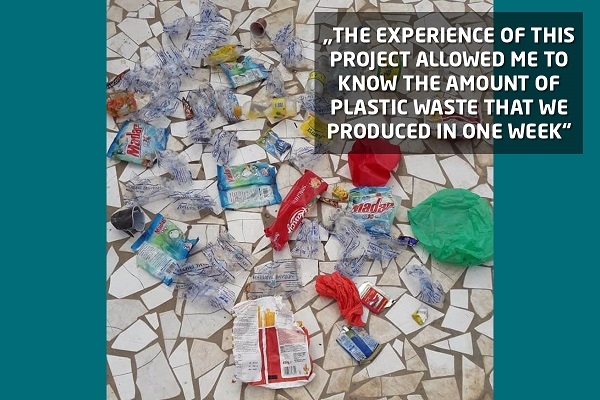
The experience of this project allowed me to know the amount of plastic waste that we produced in one week. It also allowed the family to do some kind of sorting even though it was a little complicated for them at the beginning, because at first I did not tell them why I was doing this. It was at the end that they were explained. But still, they enjoyed it. In summary the experience was cool and informative.
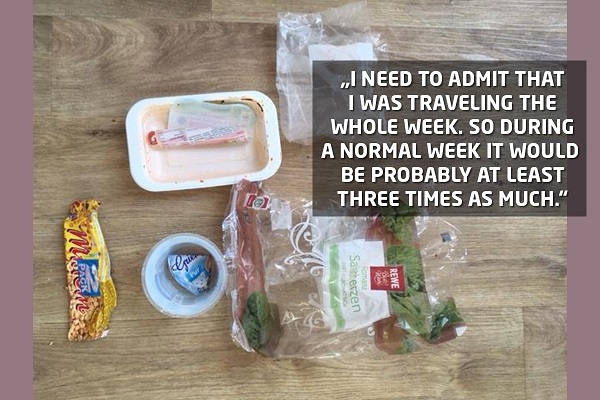
I need to admit that I was traveling the whole week. So during a normal week it would be probably at least three times as much. So now comes upt the question if traveling is good for reducing my plastic waste and sustainability? But travling is a big issue concerning the reduction of CO2-emissions.







